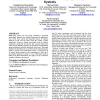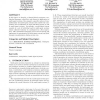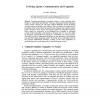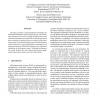112
Voted
ATAL
2005
Springer
15 years 8 months ago
2005
Springer
Multi-agent systems are now being considered a promising architectural approach for building Internet-based applications. One of the most critical and important aspects of softwar...
139
Voted
ATAL
2005
Springer
15 years 8 months ago
2005
Springer
Rational strategic reasoning is the process whereby an agent reasons about the best strategy to adopt in a given multi-agent scenario, taking into account the likely behaviour of ...
127
Voted
ATAL
2005
Springer
15 years 8 months ago
2005
Springer
Many multi-agent systems consist of a complex network of autonomous yet interdependent agents. Examples of such networked multi-agent systems include supply chains and sensor netw...
110
Voted
ATAL
2005
Springer
15 years 8 months ago
2005
Springer
In this paper we describe a channel-based exogenous coordination language, called Reo, and discuss its application to multi-agent systems. Reo supports a specific notion of compo...
135
Voted
ATAL
2005
Springer
15 years 8 months ago
2005
Springer
One of the difficulties to adapt MDPs for the control of cooperative multi-agent systems, is the complexity issued from Decentralized MDPs. Moreover, existing approaches can not ...
139
click to vote
AISADM
2005
Springer
15 years 8 months ago
2005
Springer
Computer programming of complex systems is a time consuming effort. Results are often brittle and inflexible. Evolving, self-learning flexible multi-agent systems remain a distant ...
111
click to vote
AIIA
2005
Springer
15 years 8 months ago
2005
Springer
We look at extensions of modal logic for representation and reasoning in the area of multi-agent systems. Building on dynamic logic and Henkin quantifiers, we study an unusual typ...
128
click to vote
ITCC
2005
IEEE
15 years 8 months ago
2005
IEEE
Developing large multi-agent systems is a complex task involving the processes of the requirement, architecture, design and implementation of these systems. In particular, the arc...
113
click to vote
IAT
2005
IEEE
15 years 8 months ago
2005
IEEE
Choosing when to communicate is a fundamental problem in multi-agent systems. This problem becomes particularly hard when communication is constrained and each agent has different...
93
Voted
DSRT
2005
IEEE
15 years 8 months ago
2005
IEEE
The paper presents a load management mechanism for distributed simulations of multi-agent systems. The mechanism minimises the cost of accessing the shared state in the distribute...




